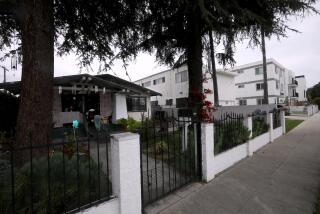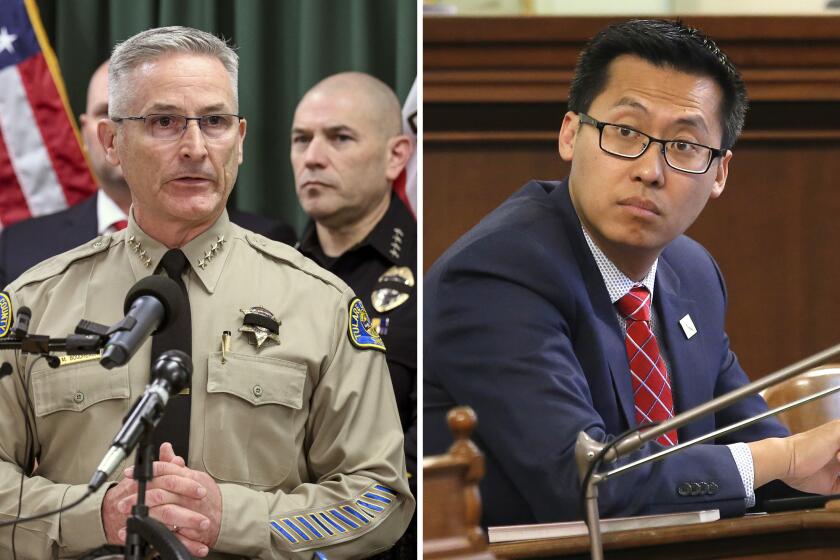No Action to Be Taken in Conflict Case
Neither the state Fair Political Practices Commission nor the Riverside County district attorney will take action against Corona City Councilman William Miller, who was accused last year of violating the state’s conflict-of-interest law.
By participating in a pair of votes on developer fees for new school construction, the former mayor violated the letter of the state’s conflict-of-interest law but not the spirit of the law, a spokeswoman for the state’s political watchdog agency said.
“I’m obviously not very surprised,” Miller said, “because this is what I anticipated from the start. I am glad it’s over so I can get back to being more active and more effective.”
Both the Fair Political Practices Commission and the district attorney investigated Miller’s votes after local school board president Sally Hoover complained that, because he was potentially affected by the school construction fees, Miller should have abstained from voting.
At the time of his votes, Miller owned an interest in an 88-unit apartment complex planned for northern Corona. His project would have been subject to the school construction fees, but the effect of Miller’s votes was to increase the potential fee on his project by $46,728.
“His vote would have had a detrimental effect on his own financial interest,” Susan Harrigan, a spokeswoman for the Fair Political Practices Commission, said this week. “We didn’t feel it was in the spirit of the Political Reform Act to prosecute a public official who voted to his own detriment, or against his own interest. . . .
“He should have disqualified himself from the vote. The law doesn’t (differentiate) if (a particular vote) has a detrimental or beneficial effect.”
Miller has since sold his interest in the River Road apartment project and is involved in no developments in the city, he said.
A report on the district attorney’s investigation in October concluded “that there was at least a technical violation” on Miller’s part, but Dist. Atty. Grover Trask said at the time that he would withhold a decision on prosecuting Miller until the state commission had completed its investigation.
“We will follow the recommendation of the FPPC,” said Deputy Dist. Atty. Steve Cunnison, speaking on Trask’s behalf. “If their recommendation is no prosecution, then we certainly will abide by it.”
Hoover, who now serves with Miller on a joint City Council-Board of Education committee studying the fees, said: “I can’t speak for the board, but there has been no talk of pursuing it further.”
The controversial votes came last March 20, when the City Council rejected the school board’s request to charge residential developers from $2,079 to $5,389 for each new housing unit built in Corona.
Instead, the council told city attorneys to draft an ordinance increasing the city’s fixed fee by almost a third, to $2,610 per unit. Miller voted with the 3-2 majority on both questions.
The council enacted its flat fee on May 1 by a 3-1 vote with Miller abstaining. After the March 20 meeting, the councilman abstained from all decisions on developer fees, Miller said, on the advice of city attorneys.
The joint committee on which he and Hoover now serve is close to resolving the dispute on school construction fees, Miller said.
“We haven’t reached any agreements,” Hoover said, “but we haven’t reached any standstills. There seems to be a lot of cooperation on both sides.”
More to Read
Start your day right
Sign up for Essential California for news, features and recommendations from the L.A. Times and beyond in your inbox six days a week.
You may occasionally receive promotional content from the Los Angeles Times.


![Stephanie Lazarus, a Los Angeles police detective charged with capital murder in the 1986 slaying of her ex-boyfriend's wife pleaded not guilty during her arraignment in Los Angeles Superior Court Monday morning, July 6, 2009. (AP Photo/Al Seib ,Pool)]](https://ca-times.brightspotcdn.com/dims4/default/189ca94/2147483647/strip/true/crop/2400x1605+0+76/resize/320x214!/quality/75/?url=https%3A%2F%2Fcalifornia-times-brightspot.s3.amazonaws.com%2F65%2Fe0%2F8228b5b44c0da5be07c48647ce71%2Fdetective-killing.JPEG)



